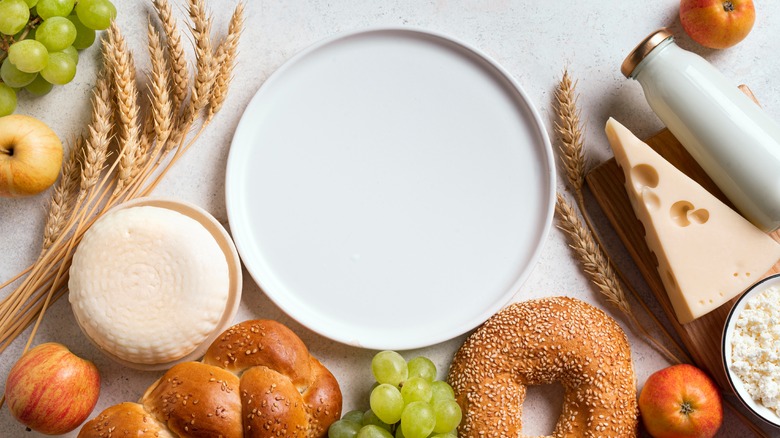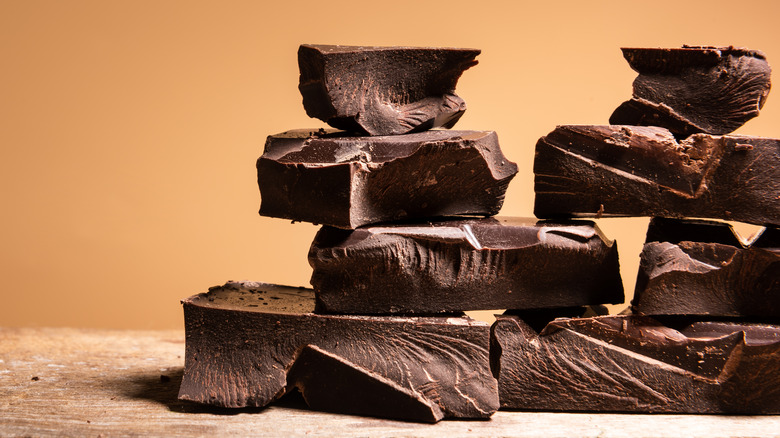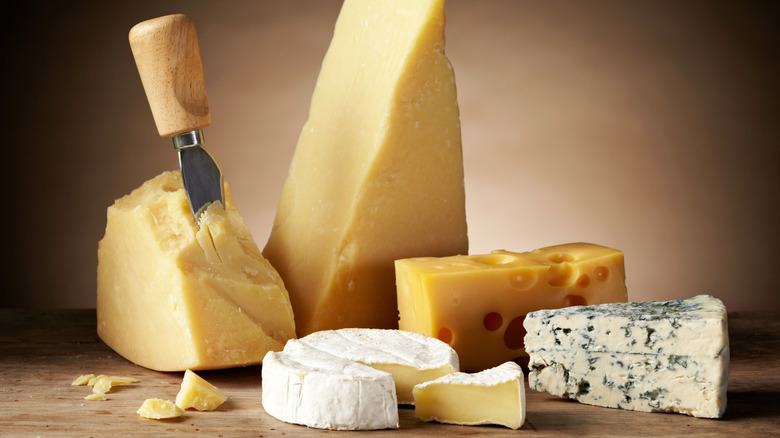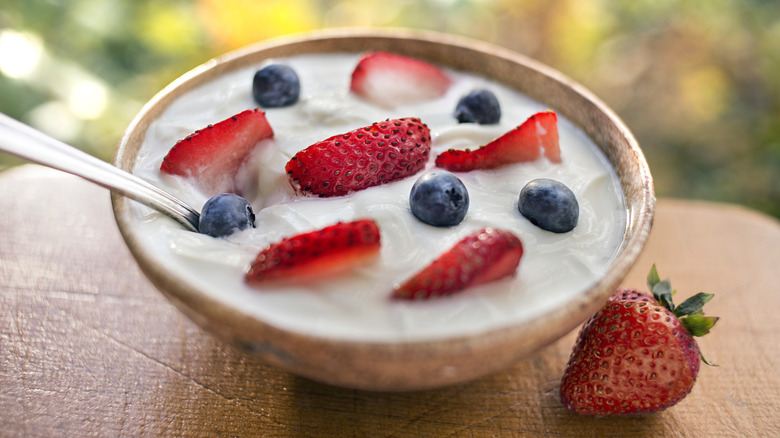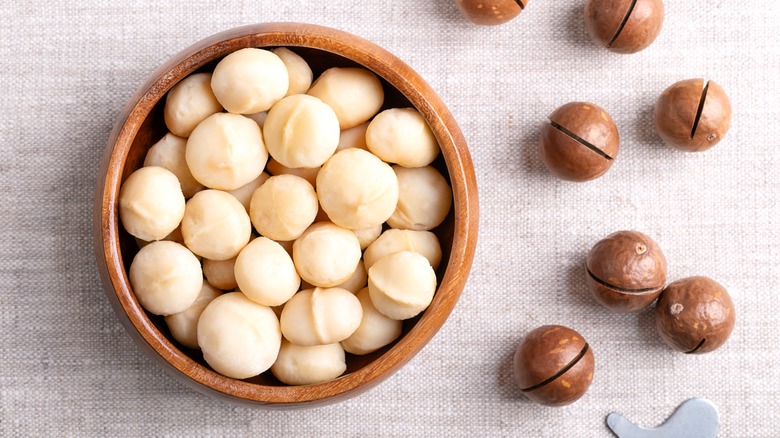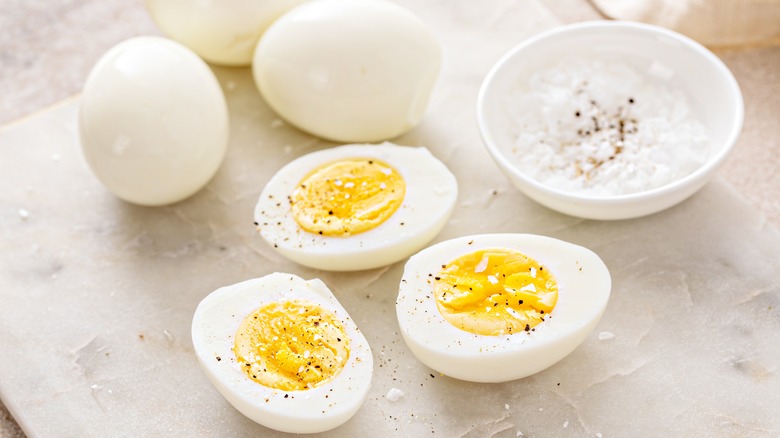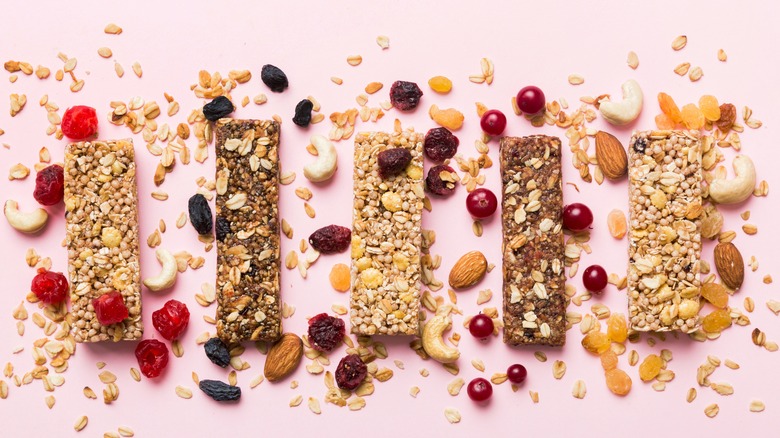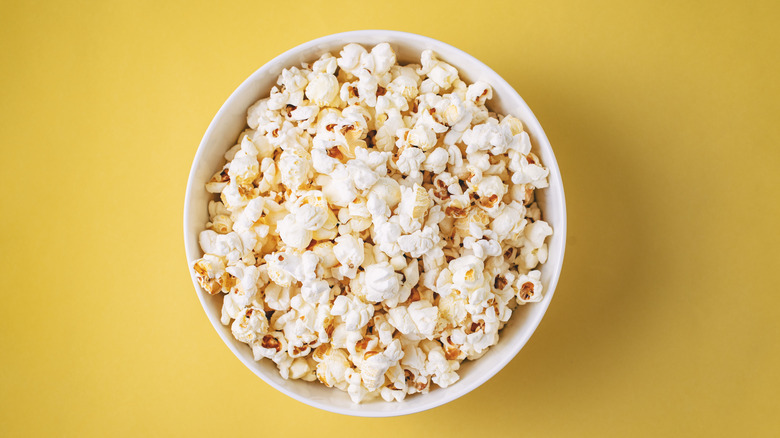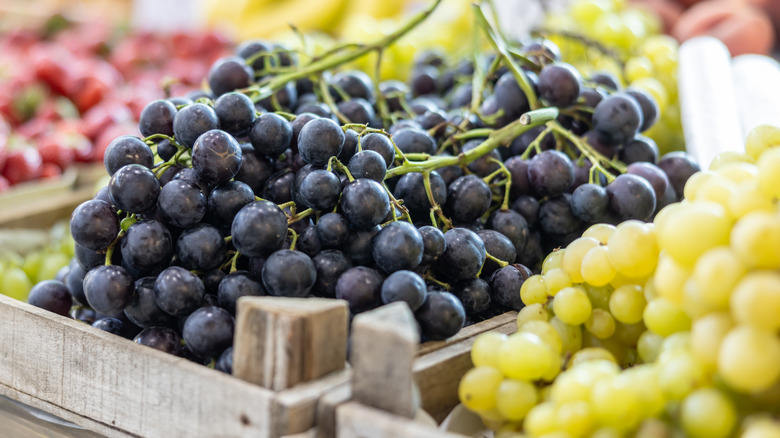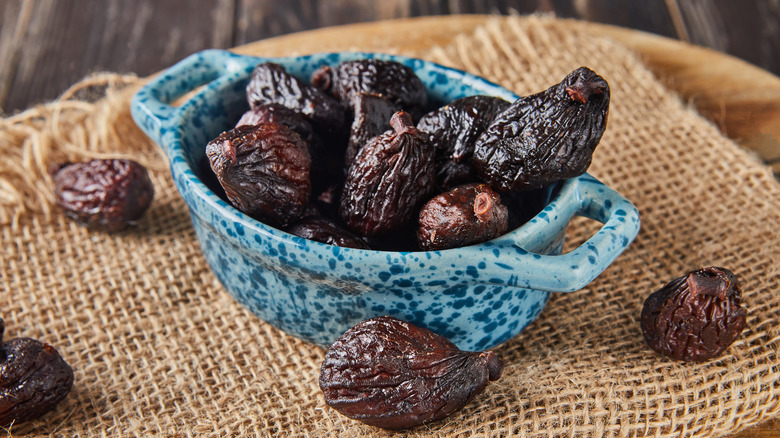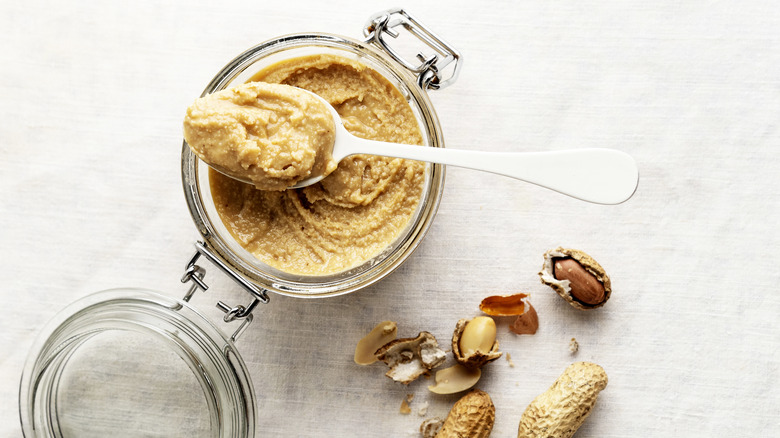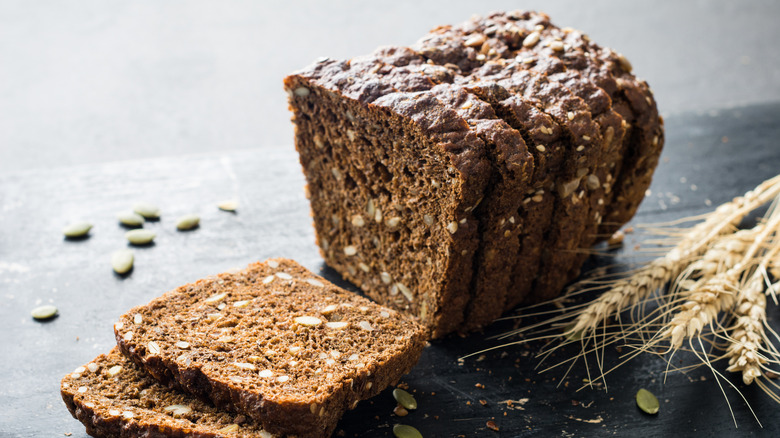These 'Bad' Snacks Are Healthier Than You Think
Snacking can be a minefield. There's nothing wrong with listening to the cues of your body and eating when you're hungry. However, we're often told either that snacking is harmful across the board or given confusing information about what constitutes a "good" snack or a "bad" snack. There are actually some snacks that people often consider unhealthy that are more nutritious than you'd imagine. We wanted to get to the bottom of things, so we spoke to two registered dietitians to learn more.
First off, should we even be calling some snacks "bad"? "Labeling food as "good" or "bad" can often oversimplify the complex relationship we have with nutrition," says Lauren Manaker MS, RDN, LD of Nutrition Now Counseling. She suggests that, rather than categorizing foods into strict categories, it might be better to focus on balance and moderation. "This approach encourages individuals to enjoy a variety of foods while also recognizing the importance of nutrient-dense choices. Emphasizing balance allows for occasional indulgences without fostering guilt or restriction, ultimately promoting a healthier and more sustainable relationship with food," she explains.
It makes sense that we shouldn't moralize food at all and instead just aim for balance. Still, we might want to focus on snacks during the day that are going to fuel our bodies and make us feel energetic. In which case, you might be interested in these "bad" snacks that are healthier than you think.
Chocolate
You might think that chocolate is definitely unhealthy. It's a total no-brainer. Well, it might not be as cut-and-dry as you'd imagine. Sure, nobody's suggesting that Hershey's bars or Snickers are healthy foods, but some chocolate is better for you than you'd think. If you're looking for a sweet snack with some nutritional value, dark chocolate is the way to go.
"Often dismissed as merely a decadent treat, dark chocolate (with a cocoa content of 70% or higher) can actually be a heart-healthy snack," Registered Dietitian Nutritionist Lauren Manaker tells us. So, what's good about dark chocolate? "Rich in antioxidants, particularly flavonoids, it can help lower blood pressure and improve heart health by enhancing blood flow," explains Manaker. "Additionally, dark chocolate boasts minerals such as iron, magnesium, and zinc, contributing to overall well-being."
So, next time you're craving chocolate as a snack, remember that it's not just okay to enjoy it as part of a healthy diet, but it might also have nutritional value, too. But, as with anything, you shouldn't entirely go to town. "Just remember to consume it in moderation, as a small piece can offer significant health benefits without excessive sugar intake," Manaker says.
Cheese
Cheese is often vilified for being full of fat, and people are frequently made to feel bad about eating it as a snack. Well, let's start with the fact that you should never feel bad about eating any food. But, that aside, cheese is a much healthier food than a lot of folks think. In fact, it's dietitian-approved.
"Cheese is often seen as unhealthy for its fat and sodium content, but cheese contains other essential nutrients like protein and calcium," explains Patricia Kolesa MS, RDN founder of Dietitian Dish LLC. Lauren Manaker of Nutrition Now Counseling agrees that it can be a healthy choice. "It is a source of calcium and protein [...] cheese can also provide probiotics, supporting gut health, especially in varieties like cottage cheese or yogurt cheese," she says.
Fat is a vital part of a healthy diet, so there's no reason to avoid it. But, for some people, there are dietary reasons to opt for lower fat foods, in which case, not every cheese will be a great snack. According to Manaker, "certain types, like feta or mozzarella, can be lower in fat."
Kolesa adds, "if you're concerned for your fat or sodium content, you could always opt for low-fat cheese options." She notes that "some great cheese choices include cottage cheese, ricotta cheese, feta cheese or mozzarella cheese, as they are lower in saturated fats and higher in protein."
Yogurt
While yogurt was once thought of as a healthy snack, many people's opinions of it have changed in recent years. Lots of yogurts are now packed full of sugars or artificial sweeteners, and may have additives, such as artificial colors and flavors. However, not all yogurt is this way and it can still be a healthy snack if you choose the right options.
"Consumers often avoid yogurts for their sugar content, but many yogurt varieties contain probiotics, bacteria that can balance your gut microbiome and are good for gut health," Patricia Kolesa remarks. But, that's not all. "Yogurt is also a great source of protein and calcium," she adds.
Of course, you still have to know which yogurts are the most nutritious and which you should leave at the store. "If you're concerned about added sugars or your overall sugar intake, try Greek yogurt or Icelandic yogurt, as they are often lower in sugar and higher in probiotics," Kolesa advises. "Some brands even have less sugar or zero sugar varieties you can try." It's good to acquaint yourself with the store-bought yogurts with the best and worst quality ingredients.
Alternatively, you can just avoid sugary yogurts altogether. "Another helpful strategy is to purchase plain yogurt and add in your favorite fruit and nuts for a balanced snack option," says Kolesa. If you must have a sweet element, you can add your own honey or maple syrup, but you have full control over the quantities.
Macadamia nuts
Some people avoid nuts, believing that their high fat content makes them unhealthy. The problem with this belief is that fat doesn't make something unhealthy. In fact, our bodies need fat to function properly. Eating enough of certain fats has a whole host of effects, from keeping blood pressure and cholesterol in check to lowering the chance of getting heart disease, so there's no need to shy away from it.
All nuts are great sources of beneficial fats, but dietitian Lauren Manaker specifically recommends macadamia nuts. According to Manaker, "87% of Americans believe that eating nuts causes weight gain, but this couldn't be further from the truth." She notes that "ample data has shown that nuts can support weight management AND can offer nutrients that support many aspects of our health."
Why macadamia nuts? Manaker tells us they're "full of good fats, low in carbs, and are a delicious and natural wholefood. Their low glycemic index supports hormone balance and won't spike your blood sugar. They have a particularly impressive amount of omega-9 fatty acids."
Another reason to reach for them is that they help satisfy the desire for something rich and substantial. Plus, they just taste great. "When craving a rich and satisfying snack, macadamia nuts, while they taste indulgent, are actually quite healthful to include during snack time," says Manaker.
Eggs
Eggs have long gotten a bad rap as an unhealthy food. There was a time when people believed they played a big part in raising levels of bad cholesterol, and this reputation has stuck around, even though scientific beliefs have changed. Eggs are actually a healthy choice of snack with a range of benefits.
Although eggs contain cholesterol (as do most animal-based foods), there's only a weak link between cholesterol levels consumed and cholesterol in the blood. Eggs also contain nutrients that can lower the risk of heart disease and a range of good fats. They're rich in protein and contain vitamins, such as vitamin A and biotin. According to The Nutrition Source at Harvard University, various studies have suggested no link between moderate egg consumption and heart disease or raised cholesterol. While you still probably shouldn't eat more than one egg a day (or the equivalent over a week), they're a solid snack choice.
Of course, eggs aren't the kind of thing you can just snack on without preparation. Perhaps the most common way to eat them at snack time is hard-boiled. You can boil a batch and keep them in the fridge for around a week, so they're always convenient when you need a snack. There are ways to keep hard-boiled eggs fresher for longer, if you're concerned. You could also consider preserved eggs by pickling them.
Granola bars
It seems to be a popular opinion that granola bars masquerade as healthy but are actually packed with sugar. So, when you're looking for nutritious snacks at the grocery store, you probably avoid them. After all, they're just processed and basically as sugary as candy bars, right? Well, this isn't always the case. And, in fact, some nutritionists recommend them as snacks.
They might be "feared for their sugar content, but granola bars can be included as part of a balanced on-the-go snack," says Patricia Kolesa of Dietitian Dish. It's not that you should avoid them altogether but rather look for the healthier ones at the store, because not all are created equal. It's a good idea to learn the unhealthiest breakfast bars you can buy and avoid those ones.
So, what should you look for in a healthy granola bar? "Seek out granola bar brands that are a good source of fiber and protein (more than 2 grams per serving) and lower in added sugars," Kolesa suggests. "Granola bar brands like MadeGood, 88 Acres, and BearNaked Bites have varieties that check off all of these boxes." Plus, there are likely to be plenty more brands with options that fit the bill. When they're done right, granola bars are nutritious and filling, so they can pick you up out of a between-meals slump.
Popcorn
When you think of popcorn, you might envisage squirts of synthetic neon "butter" or caramel-coated kernels. Admittedly, these aren't the healthiest snacking options, but other types of popcorn absolutely can be. There's a world in which you can shove handfuls of popcorn into your mouth and still load up on nutrients.
"One snack that people often deem unhealthy but is surprisingly beneficial is popcorn," notes dietitian nutritionist Lauren Manaker. "While it's frequently associated with movie theaters and butter-laden toppings, air-popped popcorn is a whole grain that's high in fiber and low in calories."
But, that's not all it offers in terms of nutrition. "It provides essential antioxidants and can be a satisfying snack when prepared without excessive oil or salt," Manaker says, remarking that it's considered a wholegrain, which means it's full of fiber. "Plus, the act of munching on popcorn can help satisfy cravings, making it a smart choice for those looking to maintain a healthy lifestyle without sacrificing their snacking enjoyment," she adds.
While you can buy healthy popcorn at grocery stores that doesn't have too much salt or sugar, the beauty of it is that you can also make it yourself. There are multiple ways to pop popcorn, many of which don't require any specialist equipment. Then, you can season it your own way, minimizing sugar and leaving out unnecessary additives.
Grapes
People are so concerned about the impact of too much sugar that certain fruits are considered unhealthy by some. With a high sugar content, grapes have ended up on the firing line. However, you really shouldn't worry too much about grapes (and other fruits). The types of natural sugar they contain aren't the same as cane sugar or, worse, something like high-fructose corn syrup.
"A common concern I often get in my practice is that grapes are unhealthy due to their sugar content," dietitian Patricia Kolesa tells us. But, this is an unfounded work. "Grapes actually contain a variety of essential nutrients." So, what's good about them? "Grapes contain flavonols, an antioxidant that has been shown to improve our cardiovascular systems," Kolesa explains. "Similarly to other fruits, grapes are hydrating, being over 80% water based."
Even dietitians agree — there's no reason to avoid grapes and many reasons to eat them as a snack. Not sure what to eat them with? Kolesa has some ideas. "A few easy ways to enjoy grapes are part of a charcuterie board with low-fat cheese and whole-grain crackers, sliced in yogurt, or as part of a fruit salad," she says. Frozen grapes are also delicious and highly refreshing in summer.
Prunes
Prunes are another casualty of the war against sugar. People often think of them as unhealthy because they're sweet and the sugar is even more concentrated in dried fruit. Prunes also need a bit of a PR makeover. They're seen as unfashionable and many people have never even tried them, but they're just dried plums. And, they're full of goodness, so you should give them a shot.
"Prunes, often perceived as an unhealthy snack due to their perceived high sugar content, are in fact a nutritious choice that offers a variety of health benefits," says nutritionist Lauren Manaker. "Packed with essential vitamins and minerals, they are particularly rich in potassium, which helps maintain healthy blood pressure levels. Moreover, prunes are a source of dietary fiber, aiding digestion and promoting a feeling of fullness." That seems like a lot for one little dried fruit to do, but they don't stop there. "One of their notable benefits is their contribution to bone health; prunes contain several compounds that support bone density," Manaker adds. But, you should still be careful to choose the right kinds of prunes. And, don't overdo it! "Just look for options with no added sugars and watch your portion size," Manaker advises.
Peanut butter
You might imagine peanut butter slathered in a PBJ or inside a peanut butter cup. Some varieties are also packed with palm oil and sugar. However, it can absolutely be a healthy snack — and it's probably better for you than you think. This popular spread is nutrient-dense and filled with protein, healthy fats, vitamins, and minerals.
The protein in peanut butter helps build and repair tissues, making it an excellent choice for muscle maintenance and growth. Its healthy fats, primarily monounsaturated and polyunsaturated fats, can support heart health when you eat them in moderation. Peanut butter is also a good source of vitamin E, an antioxidant that protects cells from damage, and B vitamins like niacin, which aids in energy metabolism. What's more, peanut butter provides minerals such as magnesium, which is vital for bone health and energy production.
Some ways of eating peanut butter are healthier than others. For instance, it's particularly good for you when spread on other nutritious foods, such as apple slices or celery sticks. It might not be hugely healthy eaten with sliced white bread, but it's better for you on a piece of wholegrain toast. You could also just eat a spoonful or two straight from the jar.
The type you choose matters, too. Opt for natural varieties with minimal added sugars and oils, as these are more nutritious, and take care to avoid peanut butter brands with the lowest quality ingredients.
Bread
Bread is often unfairly categorized as an unhealthy snack, but it can actually be quite nutritious. This misconception likely stems from the prevalence of highly processed white bread in many diets. But the fact is, bread is more nutritious than many people realize, especially certain varieties.
Whole wheat, whole grain, sprouted grain, and rye breads are particularly nutritious choices. These types of bread retain more of the grain's natural components, including the bran and germ, which contain essential nutrients and fiber. On the other hand, white bread — particularly mass-produced grocery store varieties — undergoes more processing that strips away many of these beneficial elements. Sprouted grain breads may offer additional benefits, as the sprouting process can increase the bioavailability of certain nutrients.
But, what about carbs? You might be asking. While low-carb diets have gained popularity, we all need carbohydrates. They serve as the body's primary source of energy, fueling brain function and physical activity. Complex carbohydrates, like those found in whole grain breads, keep you going for longer and generally contribute to health.
The key is to choose nutrient-dense carbohydrate sources and consume them in appropriate portions as part of a balanced diet. Whole grain breads are a great example, offering not just carbohydrates but also fiber, vitamins, and minerals. And, if you're worried about additives, you could always make bread from scratch. There are some easy ways to upgrade homemade bread you might be interested in.
